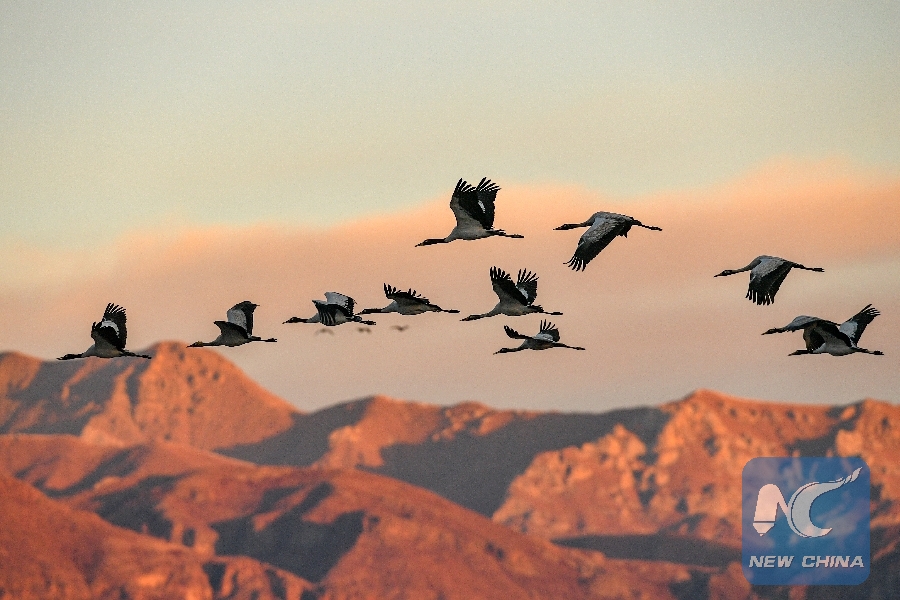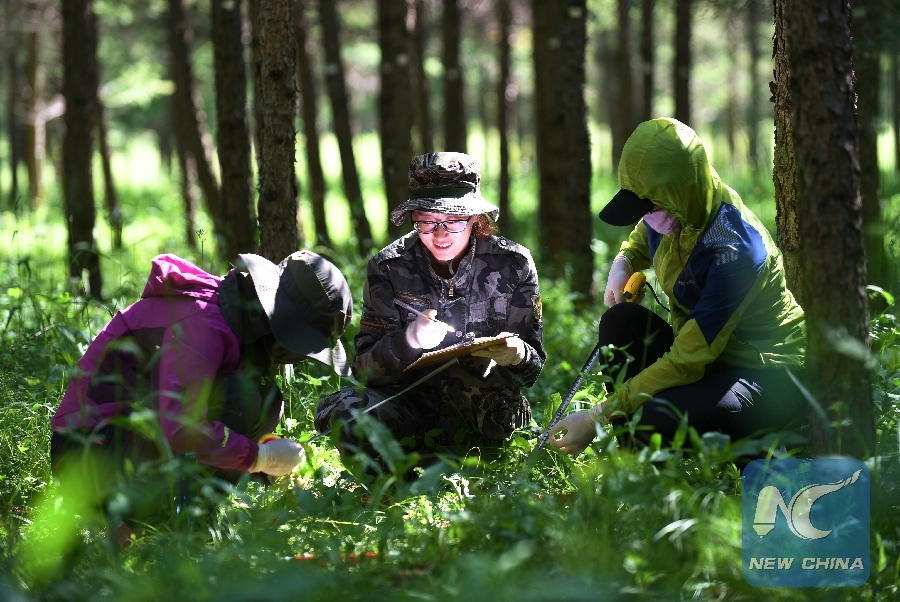
Black-necked cranes fly over the natural reserve for black-necked crane in Lhunzhub County, southwest China's Tibet Autonomous Region, Jan. 1, 2019. As "clear waters and lush mountains are invaluable assets," China is seeking better coordination between economic and social development and ecological civilization and has delivered visible results. (Xinhua/Zhang Rufeng)
by Xinhua writer Gao Shan
CLAREMONT, the United States, April 20 (Xinhua) -- Chinese and American scholars called on the two countries and the rest of the world to strengthen cooperation on ecological civilization at an international forum, which kicked off here on Friday in western U.S. state of California.
Themed "Ecological Civilization and Holistic Human Development," the forum is hosted by the Institute for Postmodern Development of China, a U.S. think tank and non-profit organization.
Over 160 scholars from China, the United States and other countries are exchanging views on the latest developments in ecological civilization at the Pitzer College in the two-day event.
"Let's work together to create an ecological civilization," said John B. Cobb Jr., a 94-year-old member of the American Academy of Arts and Sciences in his welcome remark at the opening ceremony.
"I have said many times that my hope for the future of process thinking is in China," said Cobb, noting that China is now far in the lead in the development of ecological civilization. Cobb has been advocating for green development and more efforts to avoid global ecological crisis since 1970s.
"More and more, we want to learn from you and to share our ideas with you," he told Chinese scholars in his speech.
He noted that China has adopted the goal of ecological civilization and changed policies accordingly.
Cobb is the author of more than 50 books and the founding president of the Institute for Postmodern Development of China, donating all of his money to support its operation and activities.
He said that China's commitment to become an ecological civilization has inspired some cities in other countries and expressed hope for more cooperation between China and the United States in future.
"I hope that, as citizens and local communities, we can continue to build ties of friendship and mutual support," Cobb concluded.
Philip Clayton, president of the Institute for Postmodern Development of China, urged China and western countries to jointly deal with climate change.
"China became the global leader in the development of ecological civilization in 2007. China has begun to bring attention to ecological civilization in the United States, and many western countries inspired by that movement," Clayton told Xinhua.

Staff members collect data in the Saihanba forest in Weichang Man and Mongolian Autonomous County of Chengde City, north China's Hebei Province, July 12, 2017. China's Saihanba afforestation community on Dec. 5, 2017 was announced to be one of the top winners of the annual UN Champions of the Earth Award for its outstanding contribution to restoration of degraded landscapes, amid the national efforts to advance ecological civilization. (Xinhua/Wang Xiao)
The Chinese government announced its first national action plan to respond to climate change in 2007, becoming the first developing country to formulate and implement the National Climate Change Program. Respect nature, follow its way and protect it. The Chinese leadership has been tirelessly promoting a simple, moderate, green, and low-carbon life for Chinese people, and asked them to treat the ecological environment with the same importance they treat their own lives.
"We have begun an annual series of international forums on ecological civilization that helps the west learn about Chinese ideas of ecological civilization. We are at a phase of new partnership opening up between China and western nations like the United States," said Clayton, adding that as the environmental crisis grows greater, the room for cooperation is much more expanded.
"This is a really important time in the history of our planet. We have an increasingly short amount of time in order to be able to take real, concerted effort to address the climate crisis, and our countries have an opportunity to collaborate and cooperate to reduce the impact of industry and agriculture in order to form the ecological civilization," said Brain G. Henning, Professor of Department of Environmental Studies at the Gonzaga University.
"It's clear to us now that no country will be unaffected by the changes to our climate. I live in Washington State and the wild fires each year are getting worse and worse. And this is causing people all over our country to realize that we need to take climate change seriously and to reduce the carbon pollution in our environment," he added.
Some Chinese scholars introduced the latest development of China's ecological civilization construction, emphasizing the importance and necessity of cooperation in the field.
In her plenary speech, Dr. Fan Meijun, program director of Institute for Postmodern Development of China, argued that new education model is urgently needed to cultivate persons who serve the local community, serve the ecological civilization.
Fan stressed that ecological civilization is a huge project which needs countries to work more in-depth cooperation.
"In this sense, the cooperation between China, the second largest economy, and the United States, the largest one, is extremely important," she noted.

